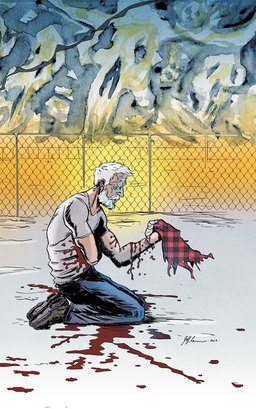Sweet Tooth #39 Review
By Zak Edwards
November 14, 2012 - 15:21
DC Comics
Vertigo Comics
Writer(s): Jeff Lemire
Penciller(s): Jeff Lemire
Colourist(s): Jose Villarrubia
Letterer(s): Carlos M. Mangual
$2.99 US
 |
Perhaps Sweet Tooth has always been working within the confines of a genre. The series certainly debuted to a cautious skepticism as another apocalypse series, Y: The Last Man, was just finishing. In many ways it does follow a certain arc of familiarity, but I think this was a series that is the very epitome of the journey over the destination. Not to say this finale has not been a gut-wrenching and satisfactory experience, but I mean much more in the sheer artistic quality of Jeff Lemire’s art. Lemire’s work, particularly when he gets to draw his own stuff, has a quiet power to it that feels entirely different from the rest of the comics I read. It goes beyond the best team-ups that can blend image and text together seamlessly and interdependently. Lemire transcends this binary at times and, while the quality of Sweet Tooth has been felt with Lemire’s growing work over at DC Comics (and his brilliant graphic novel The Underwater Welder that came out earlier this year), Sweet Tooth consistently shows how comics are a medium that moves beyond storyboarding; that the relationship between words and pictures isn’t simply slowed down animation or a visual novel.
And now, as the story has climaxed, as Jepperd has done what we all knew he would do, we are left with Gus, poor Gus, who needs to pick up the pieces and figure out what to make of it all. While the story could be read as a coming-of-age about Gus, and certainly seeing how he reacts to the loss of yet another father-figure (we could argue three at this point: his father, Jepperd, and the alienation of knowing his father never truly existed), I think this is more a story of the importance of parenting and what happens when we ‘grow up.’ Not in such a simple loss of innocence/ increase in cynicism way, but the importance these periods should have on an adult world. What we cherish, what we love, as Jepperd reminds us, comes not without complication and, at the risk of sounding cliche, a price. The price here would be the inability to see the seeds of his redemption even as he can take a final solace in his own good work, his “good boy” Gus. My first reaction to the cover, which seems misleading at first with Jepperd holding a tattered rag of Gus' clothes, ends up making perfect sense. The reverse, Gus holding something emblematic of Jepperd, is impossible because we must look at the mental state of Jepperd now that he's passed with failure and success on his mind. The demonic swirls of the background are fenced away but looming, the boy he molded, for better or worse, has slipped through his fingers. In a way this is success.
Even as so much of this is conveyed by dialogue and narration, an unfortunate turn that Lemire’s work has taken, Lemire still delivers a stunning visual piece. It’s visceral (that leg breaking is making me shuffle uncomfortably as I write this), and still moving. Lemire’s strength has never been in great action sequences, his art is too wooden in a way, so his focus continues to be on his ability to freeze moments. The action sequences don’t have flair, nor should they, because we are dealing with the most blatant mortality here. Here, movements have weight, consequences, and implications, they cannot simply hover or move without impact. So when Jepperd’s eyes lose focus, when he is no longer seeing the impact, we have a genuine culmination of the story. The gaze is integral to this book, how and when characters look at each other, it ties to perception, and what Lemire accomplishes in his art should be admired. Few else can manage this and few others, terribly so, are able to do this.
Grade: 9.5/10 Sweet Tooth is ending and we are all less for it.
Rating: 9.5/10
Related Articles:
Sweet Tooth #40
Sweet Tooth #39 Review
Sweet Tooth #36 Review
Sweet Tooth #35 Review
Sweet Tooth #26
Sweet Tooth #14
Sweet Tooth #11
Sweet Tooth #8
Sweet Tooth #6
Jeff Lemire's Sweet Tooth #1
